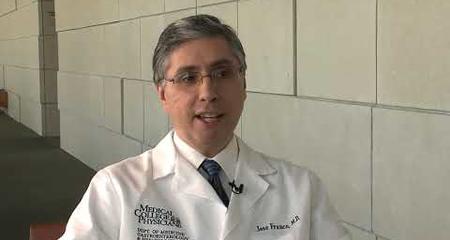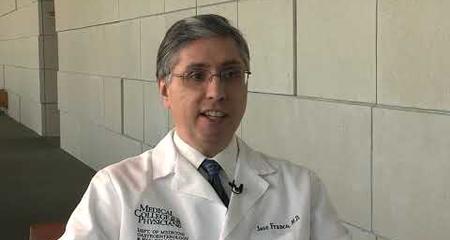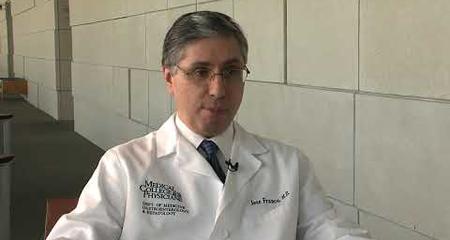Difficulty swallowing (dysphagia) affects one out of 17 Americans and often signals a serious medical problem. If a person has persistent difficulty swallowing, it’s important to make an early diagnosis. In cases where dysphagia is a warning sign of another type of illness, early diagnosis offers the best chance of successful treatment.
Patients from throughout the United States and the world come to the Dysphagia Institute at Froedtert & the Medical College of Wisconsin to receive comprehensive treatment. The Institute, one of the first multidisciplinary programs in the world for dysphagia treatment and research, is recognized internationally for its research in swallowing disorders.
Formed in 1992 by Froedtert & the Medical College of Wisconsin, the Dysphagia Institute is committed to the diagnosis, research and treatment of people with dysphagia and acid reflux disease.
The Dysphagia Institute is composed of:
A multidisciplinary team committed to the diagnosis, research and treatment of patients with swallowing disorders
- Comprehensive and sophisticated facilities to help patients with swallowing difficulties
- A clinic for evaluating and treating patients
- Research supported by grants from the National Institutes of Health and other federal funding agencies.
Many medical conditions can produce symptoms of dysphagia; therefore a team of specialists collaborate to care for people with swallowing disorders. Team members include gastroenterologists, otolaryngologists, radiologists, neurologists, speech and language pathologists and others. They work together to give each patient an accurate diagnosis. Patients also benefit from having a single physician oversee and coordinate their care within the Dysphagia Clinic. Treatment is individualized to the needs of each person.
Dysphagia Causes
The causes of dysphagia vary widely, and include
- Lack of coordination of the esophageal muscular contractions
- Chronic heartburn, where the esophagus is damaged by excessive reflux of acid-containing stomach contents
- Tumors
- Central nervous system disorders such as stroke, multiple sclerosis and Parkinson’s disease
- Scar tissue or narrowing in the esophagus
- Pouches (diverticula) that protrude through the lining of the throat and esophagus
- Radiation or operative injury
- Drug-induced injury
- Infections
Diagnosing Dysphagia
The Dysphagia Institute offers a range of diagnostic procedures to determine the cause of swallowing problems. Tests depend on each patient’s specific problem and on the results of a comprehensive interview and examination.
An evaluation may include:
- pH monitoring (a procedure to measure acid reflux from the stomach to the esophagus) to rule out gastroesophageal reflux disease (GERD)
- Video fluoroscopy and swallowing studies or manometry to assess the motor function of the upper digestive tract
- Ultra-thin endoscopy to evaluate the structure and lining of the throat, esophagus and stomach
- Impedance testing to evaluate increased resistance in the esophagus
The Institute has achieved international recognition for research in swallowing disorders. Many of the techniques for evaluating and treating dysphagia were pioneered at the Dysphagia Institute.
GI Manometry Laboratory
The GI Manometry Laboratory at Froedtert & the Medical College of Wisconsin conducts specialized tests to evaluate the esophagus for swallowing and other disorders. Esophageal manometry is a way to test if the muscles in the esophagus are functioning properly. Manometry is a pressure measurement.
Manometry is done by passing a thin, pressure-recording catheter (tube) through the nose into the esophagus. Tiny holes in the sides of the tube allow for the measurement of pressures within the esophagus and stomach. The pressure readings indicate whether or not the esophageal muscles are contracting normally. Problems such as difficulty swallowing, pain with swallowing, heartburn, chest pain, regurgitation, chronic cough, hoarseness and vomiting may be associated with abnormal esophageal muscle function.
The Manometry Lab also conducts tests to evaluate other digestive diseases, using pressure-recording catheters positioned in the gastrointestinal tract. Other tests include anorectal manometry, biliary manometry and impedance testing. Customized manometry tests are performed depending on a patient’s individual problem.
Treating Dysphagia With the Shaker Exercise
The Shaker Exercise, designed by Medical College of Wisconsin gastroenterologist/hepatologist Reza Shaker, MD, is a simple exercise that helps people improve or even restore their swallowing function without surgery or drugs. The exercise is taught to physicians throughout the world to help their patients with dysphagia and can be practiced at home.
Recognized as High Performing by U.S. News & World Report
Froedtert Hospital is recognized by U.S. News & World Report as high performing in three adult specialties and 16 procedures and conditions, including gastroenterology and GI surgery.Virtual Visits Are Available
Safe and convenient virtual visits by video let you get the care you need via a mobile device, tablet or computer wherever you are. We'll assess your condition and develop a treatment plan right away. To schedule a virtual visit, call 414-777-7700.





